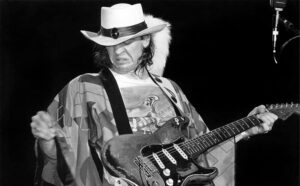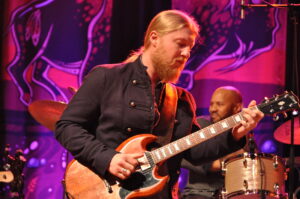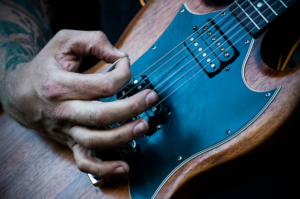Fleetwood Mac are one of the most commercially successful bands of all time.
They have sold more than 100 million records worldwide, won countless awards and accolades and until recently have continued to sell out packed arenas and stadia.
Their album Rumours alone clocked up over 40 million sales, placing it amongst the top 10 best selling albums ever.
They are a household name – widely recognised as one of the best soft rock bands ever and celebrated for hits like The Chain, Go Your Own Way and Everywhere. The individual members of the band have gained personal fame and notoriety.
You cannot say the same about Peter Green.
Peter Green was the lead guitarist, singer and original founder of Fleetwood Mac. Amongst musicians, he is highly regarded, B.B King once saying of Green:
He has the sweetest tone I ever heard; he was the only one who gave me the cold sweats
Yet beyond that, Peter Green is a figure who has largely faded into obscurity. His tragic story bears a striking resemblance to that of Syd Barrett – one of the founding members of Pink Floyd.
Like Barrett, Green was the charismatic front man and founder of his band.
Like Barrett, his presence haunted his fellow band members long after he left, and like Barrett, he was to be later diagnosed as a schizophrenic.
Unlike Syd Barrett however, Peter Green achieved huge commercial success during his time with Fleetwood Mac.
Given how relatively unknown he now is, the extent of this success is staggering. In less than the 3 years they were together, the original Fleetwood Mac:
- Produced 5 hit records
- Released 4 hit albums
- Went on to sell more records in 1969 than both The Rolling Stones and The Beatles, combined.
Within just a few short years, Peter Green had achieved greater commercial success than two of the world’s most famous bands.
He had gone from a little-known blues guitarist, to one of the most famous musicians in Europe.
Sadly, as was the case with so many musicians of the time, it was partly this rapid rise to fame and the lifestyle that came with it that led to Green’s deterioration.
Much has been written about this, and in particular about Green’s decline in mental health and his erratic behaviour.
To ignore the details of this would be wrong. Green’s struggle with mental health has come to define his life as well as much of the music he and Fleetwood Mac created.
More importantly though, I want to focus on his music and guitar playing. He is one of the best British guitarists of all time and it is that for which he should be remembered and celebrated.
Peter Green – ‘better than Eric Clapton’
Born in East London in 1946, Peter Green started learning the guitar when he was 11.
As a teenager he became involved in various different blues and rock n’ roll tribute bands. It was in the final one of these – Peter B’s Looners – where he met drummer Mick Fleetwood.
By the time he was 20, Green had already made a name for himself in the British blues scene.
His big break came when he was given the chance to stand in for Eric Clapton in John Mayall & The Bluesbreakers. Green made an instant impression, music producer Mike Vernon recalling of his debut:
I noticed an amplifier that I had never seen before, so I said to John Mayall, “Where’s Eric Clapton?”
Mayall answered, “He’s not with us anymore, he left us a few weeks ago…Don’t worry, we got someone better.”
I said…’this is ridiculous. You’ve got someone better? Than Eric Clapton?” John said, “He might not be better now, but you wait, in a couple of years he’s going to be the best’.
Then he introduced me to Peter Green.
Green went on to record The Hard Road with The Bluesbreakers, adding two of his own compositions to the album.
He left soon after to form what would become Fleetwood Mac. Already regarded as one of the best Blues guitarists on the scene, Green’s skills as a songwriter were also fast developing.
Fleetwood Mac’s first two studio albums proved a great success, and more was to follow with the release of Black Magic Woman and Albatross, the latter of which shot to number one on the British charts and remains the best-selling rock instrumental of all time in the UK.
Cults, communes & LSD
With newfound stardom came excess. Green began experimenting a lot with psychedelic drugs and his mental health also began to deteriorate.
He became increasingly uncomfortable with his material wealth and vowed to give all of his money away, urging his bandmates to do the same.
He was starting to exhibit some of the erratic behaviour that would manifest itself in a much more extreme way in the following years.
If Green was already mentally unstable, then it was the events of Fleetwood Mac’s European tour in 1970 that tipped him over the edge.
On touching down in Munich, Green was targeted by members of what road manager Dennis Keane described as a ‘cult’.
An extremely glamorous couple appeared at the airport and greeted Green like an old friend. They followed him around for the rest of the day, and went to watch Fleetwood Mac play that night.
After the gig, the mysterious couple took Green and fellow guitarist Danny Kirwan to a huge mansion in the woods, which they had turned into a hippy commune.
Green and Kirwan took LSD and began jamming with members of the commune in the basement of the house.
When Mick Fleetwood, John McVie and Jeremy Spencer later arrived, they were met by a worried looking Keane, who warned them that Green was tripping out badly and the place had a ‘horrible vibe’.
The band called their hotel and swiftly left.
Although Green had already started to show signs of mental illness, this particular incident was one from which he never fully recovered.
To this day the band all agree with the sentiment of their manager Clifford Davis, who stated:
Peter Green and Danny Kirwan both went together to that house in Munich.
Both of them took acid… Both of them as of that day became seriously mentally ill. I think it’s too much of a coincidence for it to be anything other than the drugs
Green quit the band just a few months later.
Life after Fleetwood Mac
Shortly after leaving the band, Peter Green released his first solo album, The End of The Game.
It is a long psychedelic wah-wah laden jam and marks a significant departure from anything he produced before or since.
It was also to be his last creation for some years, as his mental health continued to decline from his LSD use.
Just a couple of years later – following an outburst in which Green smashed an entire cabinet of crockery at his brother’s house – he was interned at a psychiatric hospital.
He was diagnosed as schizophrenic shortly afterwards.
Sadly, he would go on to suffer through years of psychotic outbursts. At one point he grew his nails and hair long and wild and roamed around Richmond Park in London, howling and barking like a dog.
The most serious incident saw him smuggle a shotgun into the UK from Canada, threatening to shoot his accountant, whom he thought had withheld money from him.
The Peter Green Splinter Group
Thankfully, as treatment for schizophrenia has advanced and Green’s own lifestyle has settled down, so has his erratic behaviour. In the 1990s he went on to form the Peter Green Splinter Group.
They recorded 10 albums during their time together, including Hot Food Powder and The Robert Johnson Songbook. The albums feature cover versions of every song Robert Johnson is known to have recorded.
It is quite amazing that after more than a decade of serious mental health problems, Green was able to produce two albums, both of which are eminently listenable.
Sadly though, his guitar playing lacks the fiery intensity of the Fleetwood Mac days.
It may just be the sign of an ageing musician who has mellowed, but one can’t help think that it has more to do with his fragile mental state.
Peter Green’s Legacy
For those that played with and knew Peter Green during the Fleetwood Mac years – like Mick Fleetwood and John Mcvie – the weight of Green’s story still weighs heavily, the latter reflecting that:
He was one of the best. If not the best. That’s why it’s such a tragedy that it all went the way it did. He could have been so much more.
The sentiment is one that is often expressed about Green.
Yet whilst his career may have been cut short, his impact and legacy has been lasting.
He gave life to what would become the new Fleetwood Mac – a band that went on to produce some of the greatest music ever recorded.
To this day, all members of Fleetwood Mac recognise the debt they owe to Green, with Stevie Nicks stating in London during their 2013 tour – ‘Without Peter Green there would be no Fleetwood Mac.’
Beyond that and in his own right, Peter Green produced music that continues to inspire and delight listeners. It is for this that we should remember him.
He is without question one of the best and most underrated blues guitarists of all time.
Peter Green’s best moments
Given the wealth of music that Peter Green produced, choosing just five songs proved too tricky.
So here are some of my favourite tracks from both Fleetwood Mac, as well as his solo career and time with John Mayall & the Bluesbreakers:
The Stumble
Originally written by Freddie King, Peter Green recorded a version of Stumble for the album A Hard Road during his tenure with John Mayall & the Bluesbreakers.
It is my favourite version of this blues classic. Green’s guitar playing is so controlled and yet so expressive. He recorded it when he was just 21 years old.
The Supernatural
Another instrumental that Green recorded for The Hard Road.
Here we can already see Green’s ability to combine classic blues guitar with a more exotic sound that would later appear on songs like Black Magic Woman and influence players like Carlos Santana.
Green’s playing is sublime and showcases what author Keith Altham later described as its ‘lyrical quality… like liquid gold’.
Oh Well (Part 1 & 2)
I think Noel Gallagher best summed this song up, when he described watching footage of Green playing live: ‘I remember hearing the guitar riff and just thinking, f*cking hell – that’s amazing!’
The opening section, with the heavy riffing and frenetic guitar work from both Green and Danny Kirwan makes the hairs on the back of your neck stand up.
On live versions of the song, you can hear Green crack up with laughter when he starts to sing, which captures a moment of joy that is so powerful as a listener.
Need Your Love So Bad
This song embodies what the blues is all about. Sweet, soulful guitar playing and lyrics that confront one of the basic human emotions with which we are all familiar.
It also highlights how well rounded a musician Green is – unlike a lot of great blues guitarists, the quality of his vocals almost matches that of his guitar playing.
Albatross
Albatross changed everything for Fleetwood Mac.
Returning from a tour in US, the band found themselves at the top of the charts and in high demand. It came as a shock, as they had initially been dissuaded from releasing the instrumental as a single.
The guitars almost take on a vocal quality and the pacing of the song is perfectly measure and controlled. It is perhaps no surprise that it is the best-selling rock instrumental of all time in the U.K.
Black Magic Woman – Live in Boston
As cliched as this choice may be, I couldn’t exclude it from the list. The original of Black Magic Woman is undoubtedly Green’s most famous song, and you can see why.
The vocals and lyrics are brilliant, there are two blistering guitar solos and the fusion of the blues guitar with a more exotic sound from the accompanying instruments is captivating.
This live version features a much lengthier guitar solo from Green and gives a sense of how impressive he was at his pinnacle.
Man of the World
Man of the World is arguably the song by which Green is best remembered. He wrote it a year before he left Fleetwood Mac.
It perfectly captures the issues with which he was struggling and is a sad and reflective song. Mick Fleetwood later described it as being ‘pregnant with passion’ and a cry for help.
Green Manalishi
This was the last song that Peter Green wrote and recorded with Fleetwood Mac and it really illustrates his altered mental state.
It’s a dark and ominous track, warning us of the dangers of money and our obsession with material wealth.
It’s also a brilliant exhibition of Green’s musicianship.
Cryin’ Won’t Bring You Back
Although Green is a Bluesman through and through, his style within the broader genre is quite diverse.
Cryin won’t bring you back is one of his softer tracks, and one in which he infuses his guitar perfectly with the less traditionally bluesy accompaniment.
You can hear the clear influence this style had on those later guitarists like Chris Rea – who blend blues guitar with a more mainstream pop sound.
References
Team Rock, Youtube, Youtube, Wikipedia, Green: Biography, Irish Times, Youtube, Songfacts, Youtube, Youtube
Images
Feature Image – Nick Contador (Wikimedia Commons) The License for the image is here.





Responses
Peter Green deserves far more credit.
His style was so magnificent. He would literally make his guitar sing with his sexy, bluesy energy. Channelling it directly to your soul.
Fantastic article.
I totally agree Amr! I’m just blown away every time I listen to albums like Live in Boston. Peter Green’s energy, playing and singing are all amazing; I think he is arguably the best British blues guitarist of all time. I’m really glad to hear you liked the article and thank you very much for the kind words 🙂
Then Play On was my first LP purchase at the age of 15 and I quickly hooked on Peter Greene mastery of the guitar. I was happy to see that when playing Peter’s music for friends they too became immersed in his craft. I’ve gotten more joy listening to his music over the past 50 years along with feeling saddened at his personal troubles. I appreciate the occasional articles about Peter and thank you for you superb view on Peter. Your list of Peter’s best is very close to my list. Thanks for keeping his legacy alive.
Thanks so much for the kind words Dave, I really appreciate them. And I’m so glad that you enjoyed the article. It sounds like our experiences are very similar – I first heard Green when I was about 13 and had just started to play the guitar. I loved his sound and playing, and he had quite an impact on my early guitar playing. I’ve ‘rediscovered’ Green in the last few years and it has only deepened my appreciation for his musicianship. In my opinion he is without doubt one of the most gifted blues guitarists of all time.
Hello,
I enjoyed this read, thank you. As I am always learning more about Peter having been a huge fan since 1990 when I heard his band by chance in a record store one day in Minnesota, and asked the owner ” . . . who this was?” I do have a question about your mention of “Slabo Day” . I heard the song on Youtube a few months back and never prior. I read in the comment section about his playing in that song and Sony White commented it was him who was playing lead and not Peter. Continuing, he said he wished it was Peter who played it that day, but Peter insisted he (Snowy) should and that he wasn’t “ready yet”. Anyways, my question is did he record it prior with him playing lead? If so, where might I locate it and what else do you know about that song?
Thanks, Mitch
Thanks so much for the comment Mitch and for sharing how you initially discovered Green. Like you, I have been a fan of Green for many years – but I really fell in love with his playing and music a number of years ago (around the time I wrote this article). At that time I wasn’t aware – as I am now and as you have pointed out – that Green didn’t actually play on Slabo Day. And although it is a beautiful instrumental played expertly by Snowy White, were I to write this list again (which I will do in time!) I would definitely omit it. Not only because it’s not actually Green playing, but because having listened to more of his discography, I think there are much better examples of his playing on the Live In Boston albums, on Then Play On and also on the compilation album Men Of The World: The Early Years
So I shall certainly go back and update this article in due course, because every time I hear the quality of Green’s playing on those albums, it just blows my head off! 😁 Thanks again Mitch, and if I can ever help at all with your playing (or with further blues music recommendations) please do let me know. You can reach me on aidan@happybluesman.com and I am always around and happy to help!
I always thought tha when playing any song you always have to go back to the key of the song. Ending on the fifth chord leaves one hanging so to speak
As an early 60’s hippie I spent much of my time playing guitar and listening. Saw Peter Greene several times with Moby Grape jam group and Fleetwood Mac just before Woodstock. It’s been years and I have now seen thousands of other incredible musicians. However, I remember Peter as the best I had ever heard at the time and no other artist has ever impressed me as much since then. He may have been the GOAT.